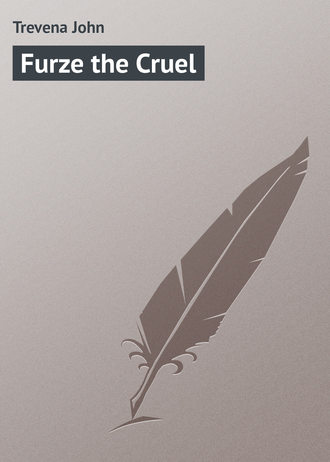 полная версия
полная версияFurze the Cruel
"You've done with young Pugsley?" Pendoggat muttered.
He pulled her hair down roughly, hurting her. Thomasine had good brown hair in abundance. He wanted to see it lying on her skin. Anything to add fuel to the fire!
"Iss, sir."
"That's well. If you and he are seen together there'll be hell," he cried savagely. "You're mine, blood and flesh, and all that's in you, and I'll have you or die for it, and I'd kill the man who tried to get you away from me, as I'd kill you if you played me false and ran off to any one else. You young devil, you – you're as full of blood as a whort is full of juice."
While speaking he was half dragging her towards the ruined miner's cot, and there flung her savagely on the fern.
Much lower down, where the Tavy fretted less, being freer from rocks; where there were trees, and a shelter from the wind, and flowers also in their season, honeysuckles and rose-bays, with fern in great abundance – there could be no fairyland without ferns – and green water oozing from the banks, and a fragrant kind of mist over it all; there, where the river slanted perceptibly towards the lowland, "more down under like," as Peter would have expressed it, two little people were trying to strangle one another with pure affection. They were not pixy-folk. They were only Boodles and her boy going on with the story. They would have been out of place upon the high Tavy, on the rock-strewn side of the cleave, among the ruins of the mines. There was nothing hard or fierce about them. They were children, to be treated with tenderness; kept out of the strong wind; put among the flowers where they could roll and tumble without hurting themselves; wrapped in the clinging mist full of that odour of sweet water and fresh foliage which cannot quickly be forgotten when it has been enjoyed.
"I thought I was not going to see you any more," said Boodles with a fine indifference.
"Should you have cared very much, sweetheart?"
"Not a bit, really. A girl mustn't expect too much from a sailor boy. They are fickle, and keep a sweetheart at every place they stop at. Girls at every port. Red, white, and yellow girls. A whole heap of them!"
"But only one all the time," said Aubrey. "One best beautiful girl who makes all the others seem nothing, and that's always the girl he leaves at home and comes back to. You were always in my thoughts, darling."
"But you never wrote," murmured she.
"I promised mother I wouldn't," he said, with a little hesitation.
"Then she does know," cried Boodles quickly. "Well, I think she ought to, because we can't go on being so chummy – "
"Lovers," he amended.
"No, we can't," she said decidedly. "Your people must know all about it, and like me, and tell me I'm nice enough, if we are going on in the same old way. You see, boy, I had got used to the idea of doing without you, and I don't want to start again, and then your people to say I'm not nice enough. We are growing up now. I'm in long frocks, and – and at our age things begin to get serious," went on the seventeen-year-old girl of the radiant head somewhat dolefully, as if she was rather afraid she was past her prime.
"I'm going to take you to see mother. I promised her I would," said Aubrey. "Before going away I told her I was awfully in love with you, and she made me promise not to write, but to see what my feelings were when I came back. And now I've come back, and I love you more than ever, because I love you in a different way. I was only a boy then, and now I am a man, and it is as a man that I love you, and that sweet golden head and your lovely golden face; and if my people behave properly, I shall get a ring, and put it on this little finger – "
"You silly boy. That's my right hand," she laughed.
"Then there will be only two more years to wait."
"I shall be only a baby," sighed Boodles.
"Darling, you will be as old as I am now; and I'm nineteen," said Aubrey, with all the dignity and assurance of such longevity.
"Fancy such a child with an engagement-ring! It would be absurd!" said Boodles.
"I shan't be well off, darling," he said, making the confession with a boy's usual awkwardness.
"Then I won't have you," she declared. "I must have a boy with heaps of money, who will give me all the luxuries I have been used to. You know we live very expensively at Lewside. We have a joint of meat every week, and father has two eggs for breakfast, and I have two new frocks every year – I get the stuff and make them myself. If I had a hungry boy to keep, I should want a lot of housekeeping money, though I can make a penny do the work of three halfpence."
"Dear Boodles!"
"Does that 'dear' mean expensive? Well, I am. Some of the stuff for my frocks costs I don't know how much a yard, and it's no use trying to be pretty to a draper, for you can't smile them down a single penny."
"You are very silly, darling. As if I should let you make your own frocks!"
"You are much sillier. So silly that you are hardly fit to live. Telling me you won't be well off! I think if it was all over between us now I shouldn't care a bit."
They came out upon an open space beside the river. It was clear of trees, and the sun was able to shine upon the girl's head, so Aubrey stopped and took off her hat with reverent hands. She looked up with a pretty smile. He drew her close and they kissed fondly. It was a clean healthy kiss, with less folly in it than most, as sweet as the water, and fresh as the mist; the sort of kiss that makes the soul bud and bring forth blossoms. They had changed a good deal since those days when they had first entered fairyland. There was womanhood in Boodles, and a good deal of the man in Aubrey. They felt the change. It added responsibility, as well as pleasure, to that kiss. In much the same way their appearance had altered. Boodles was rather thinner; she had not quite the same soft, dumpling-like, school-girl cheeks. Aubrey had still the girl's face, but it had become a little hardened and had lost its down. Training and discipline had added self-reliance and determination to his character. They were a pretty pair, little housewife Boodles and her healthy boy. It was a pity they were transgressing the great unwritten law of respectability by loving one another.
"The hair hasn't altered much," murmured the radiant child.
"Only to become more lovely. It is a deeper gold now, sweetheart – real gold; and before it was trying to be gold but couldn't quite manage it."
"This face is just the same to me, except for the nutmeg-graters on the chin and lips. You have been shaving in a hurry, Aubrey."
"You know why. I had to come and meet some one."
"I think you are such a nice boy, Aubrey," faltered Boodles.
Her eyes were so soft just then that he could not say anything. He took the glowing head and placed it on his shoulder, and warmed his lips and his heart with the radiant hair. What a life it would have been if they could have gone on "happy ever after," just as they were then. The first stage of love is so much the best, just as the bud is often more beautiful than the flower.
They walked on between the sun and the fragrant mist, having by this time got quite away from the dull, old place called earth. Boodles carried her hat, swinging it by the strings, and placed her other hand naturally on his arm. Aubrey had quite made up his mind by that time about many important matters. He would marry Boodles whatever happened. He was fond of his parents, but he could not permit them to come between him and his happiness. As there was only one girl in the singularly sparsely-populated world a big price must be paid for her. Even nineteen can be determined upon matters of the heart.
"You know Mr. Weevil is not my father," she said timidly, hardly knowing why she thought it necessary to make the admission; and then, rather hurriedly, "I am only his adopted daughter."
She had to say that. She did not want him to have unpleasant thoughts concerning her origin. She wanted to be perfectly honest, and yet at the same time she dreaded his learning the truth about herself. She did not realise how ill-suited they were from the ordinary social and respectable point of view, although she wanted to justify her existence and to convince him how unwilling she was to deceive.
"I am coming to see him soon," said Aubrey at once. He did not give the matter a serious thought either. He was much too young to bother his head about such things, and besides, he supposed that his sweetheart was the daughter of some relation or connection of Weevil's, and that she had been left an orphan in her childhood, and had been adopted as a duty, not as an act of charity, by the eccentric old man. He had very kindly thoughts of Weevil, because he knew that Boodles had been well taken care of, and always worshipped in a devout and proper manner by the tenant of Lewside Cottage.
"I have told him all about you," the girl went on. "I am sure he thinks you quite a suitable person to take perpetual charge of his little maid, only he is funny when I talk to him about you. It must be because he doesn't like the idea of getting rid of me."
Aubrey supposed that was reasonable enough. He judged Weevil by his own feelings. The idea of losing Boodles would have made him feel "funny" too.
"It does seem selfish and ungrateful," the child went on. "To be brought up and petted, and given everything by a dear old man, and then one day to run off with a nice young boy. It's very fickle. I must try and feel ashamed of myself. Still I'm not so wicked as you. If you would leave me alone I should abide with him always – but then you won't! You come and put selfish thoughts into my head. I think you are rather a bad boy, Aubrey."
The young sailor would not admit that. He declared he was quite a natural creature; and he reminded Boodles that if she hadn't been so delightful he would not have fallen in love with her. So it was her own fault after all. She said she was very sorry, but she couldn't help it. She too had only behaved naturally. She was not responsible for so much glowing hair and golden skin. Others had done that for her. And that brought her back to the starting-point, and she felt vaguely there was something she ought to say about those unknown persons, only she didn't know what. So she said nothing at all, and they went on wandering beside the river where it was wooded and pleasant, and thought only of the present, and themselves, and how very nice it was to be together; until a jarring note was struck by that disagreeable thing called Nature, who never changes her mood, but works seven long days of spitefulness every week.
Aubrey had brought his dog with him, and the little beast had put aside his social instincts in that glorious hunting-ground, and had gone to seek his own pleasures, leaving his master to the enjoyment of his. Just then he returned, somewhat sheepishly, as if afraid he ought to expect a beating, and slunk along at Aubrey's heels. Boodles at once set up a lamentable cry: "Oh, Aubrey! he's got a bun, a poor little halfpenny bun!"
The dog had caught a young rabbit about the size of a rat. He dropped it with wicked delight, touched it up with his nose, made the poor little wretch run, then scampered after it, caught and rolled upon it with much satisfaction, shook it, tossed it in the air, made it run again, and captured it as before. He was as happy as a child with a clockwork toy.
"Take it away," pleaded Boodles. "It's so horrid. Look at the poor little thing's eyes! It's panting so! If he would kill it at once I wouldn't mind, but I hate to see him torture it."
The boy called his dog, who refused to obey, thinking it all a part of the glorious game. He would let Aubrey come near, then make the victim run, and scamper after it. The clockwork was getting out of order. The rabbit was nearly run down. Aubrey caught the dog, took the little creature away, struck it smartly upon the back of its neck, and the rabbit gave a little shriek, some small shivers, and died. Boodles turned away, and felt miserable.
"Shall I beat him?" said Aubrey, who was very fond of his dog.
"No – please! I don't care now the poor bun is dead. That tiny scream! Oh, you nasty little dog! You are not a bit like your master. Go away. I hate you."
"He can't help doing what his nature tells him, dear."
"Is it his nature?" wondered Boodles. "I suppose it is, but it seems so funny. He's so gentle and affectionate to us, and so very cruel to another animal. If it is his nature to be gentle and affectionate, why should he be cruel too?"
That was too deep for Aubrey, although in his confident boy's fashion he tried to explain it. He said that every animal respects those stronger than itself, and is cruel to those that are weaker. Boodles was not satisfied. She said that was the same thing as saying that affection is due to fear, and that a dog only loves his master because he is afraid of him. She was sure that wasn't true.
They did not pursue the subject, however, for at that moment Nature again intervened in her maliceful way. The dog was trotting on ahead, his stump of tail erect, quite happy with himself. Suddenly he yelped, and rushed off into the wood.
"Now he's been and trodden on an ants' nest," said Aubrey, with some satisfaction.
"Or perhaps he saw a pixy under the bracken," said Boodles.
As she spoke Aubrey caught her, swung her back to a sound of furious hissing, and Boodles saw a viper upon a patch of bleached grass, head erect, swaying to and fro, and exceedingly angry at being disturbed. It was a beautiful, as well as a malevolent, creature. Its black zig-zag markings were vivid in the sunlight, and its open mouth was as red as a poppy-leaf.
"You were just going to tread upon it," cried the boy.
"The poor dog!" lamented Boodles, all her sympathies naturally with the suffering animal.
Then she had to be sorry for the reptile, for Aubrey declared it must die, not so much because it had bitten the dog, as because it might have bitten her ankle, and he went and destroyed it with his stick.
By that time Boodles was wretched. She felt that most of the pleasure had gone out of their walk. They had been so happy, in a serene atmosphere, and then the weather had changed, as it were, and the cruelty and malevolence of Nature had come along to remind them they had no business to be so happy, and that the place was not an ideal fairyland after all. There was an atmosphere of suffering all around, though they could not always see it, and cruelty in every living thing. Even the sun was cruel, for it was beginning to make the radiant head ache.
They went after the dog, and found him much distressed, because he had been bitten in the neck, and swelling had commenced. Living upon Dartmoor, Boodles knew all about viper-bites, and she ordered Aubrey to take the dog back and attend to the wound at once. Then she had to gulp down a lump in her throat and rub her eyes. The weather had changed badly, and things had gone quite wrong. When they had walked in the wood as little children nothing unpleasant had ever happened, or at least they had never noticed anything disagreeable. Now they were grown up, as she thought, all sorts of troubles came to spoil their ramble. The dog had tortured the rabbit; the viper had bitten the dog; Aubrey had killed the viper. The tale of suffering seemed to be running up the scale towards herself. Was there any creature, stronger than themselves, who could be so brutal as to take pleasure in biting or torturing such harmless beings as Aubrey and herself?
CHAPTER IX
ABOUT A KNAVE AND A FOOL
Clever men are either philosophers or knaves; and as the world is crawling with fools the clever men who are philosophers spend their time making laws which will protect the fools from the clever men who are knaves. Sharp practice can only be punished, not stopped, so long as simpletons are willing to give a florin for a purse which they think contains two half-crowns, which is the sort of folly which gives rise to wonder how many men are really rational beings. The fool will believe anything if the knave talks long enough. No sort of folly is too hopeless when there is a clever man at the head of it. Shouting will establish a patent pill, found a new religion, produce a revolution; do any marvel, except make people decent.
Pendoggat was a clever man in his own way; and Pezzack would have been a fool anywhere. The minister had piped to others, a little jig of mines and speculations, and some of them had danced in a half-hearted way. In his quaint but sincere fashion he had preached of gold and precious jewels; of bdellium and the onyx stone. It was the doctrine of "get rich" that he proclaimed, and his listeners opened their ears to that as they would scarcely have opened them to any more orthodox message of redemption. "Do good to your body, and your soul will do good to itself," was in effect what Pezzack was teaching, although he didn't know it, and would have been grieved had any one suggested it. He desired to place his listeners in comfortable circumstances, from the retired grocer of Bromley to the Dartmoor widow who had five pounds' worth of pence saved up in a teapot; to take unto himself a helpmeet; last and least – although again he did not put it in that way – to rebuild Ebenezer. So he preached of treasures hidden in the earth, and promised his hearers that every sovereign sown therein would germinate without a doubt, and bring forth in due season a healthy crop of some ten per cents, and some twenty per cents.
People did not tumble over one another in any haste to respond. They might not be clever, but they could be suspicious, and they asked at once for particulars, desired to see the good thing for themselves, and some of them wanted the twenty per cent, paid in advance by way of guarantee against loss. There were plenty of wild stories concerning the treasures of the moor. Were there not, upon every side, evidences of the existence of precious minerals in the shape of abandoned mines? There were tales of rich lodes which had been lost, but were sure to be picked up again some day. The mining tradition was strong; but it was notorious that copper and tin could hardly be worked at a profit. Pezzack answered that he had discovered nickel, which was something far better, and his announcement certainly did cause some of the flutter which Pendoggat had looked for. The retired grocer took advantage of an excursion train to Plymouth, ascended upon the moor, and having been sworn to secrecy was conducted by Pendoggat, acting as Pezzack's manager, to the treasure cave, and shown the ripe nickel running down its sides. Pendoggat also knocked off a piece of the wall and appeared to give it to the retired grocer as a sample. What he actually gave him was a fragment of dirty-grey metal, which had not come from that cave or anywhere near it, but had been procured by Pendoggat at some expense, seeing that it really was a sample of nickel. The retired grocer had come down in doubt, but returned converted to Bromley, submitted the sample to an analyst, and subsequently acted foolishly. He was meddling with what he did not understand, which is one of the most attractive things in life. Adulterated groceries he could comprehend, because he had won retirement out of them; but the mining industry was something quite outside his experience. Apparently he thought that nickel could be taken off the sides of a cave in much the same way as blackberries are picked off a hedge. He confided the matter to a few friends, making them swear to say nothing about it; and when they had told all their acquaintances applications for shares in the good thing began to reach the retired grocer, who unfortunately had nothing to occupy his time. He was soon feeling himself a man of some importance, and this naturally assisted him to entertain a very avuncular regard for nephew Pezzack, and a friendly feeling for the "simple countryman Pendoggat" and the precious metal called nickel. He thought of himself as a financial magnate, and subscribed to the Mining Journal. He talked no more of prime Dorset, nor did he discuss concerning the most suitable sand to mingle with sugar; but he rehearsed the slang of the money-market instead, remarked that he had struck a gilt-edged security, looked in the paper every morning and observed to his wife that copper was recovering, or that diamonds continued to droop. The head-quarters of the Tavy Cleave Nickel Mining Company were really not upon Dartmoor at all, but at Bromley in a straight little jerry-built street; which was exactly what the "simple countryman Pendoggat" wanted.
A meeting of prospective shareholders was held in the chapel, but it turned out a wet stormy evening and very few attended. Brother Pendoggat led in prayer, which took a pessimistic view of things generally; Pezzack delivered an impressive address on the need of more stability in human affairs; and when the party had been worked into a suitable state of enthusiasm, and were prepared to listen to anything, they got to business.
The minister was destined to be astounded that evening by his brother in religion and partner in business. Eli told the party what it was there for, which it knew already, and then unfolded his prospectus, as it were, before their eyes, telling them he had discovered a rich vein of nickel, and contemplated forming a small company to work the same. It was to be quite a private affair, and operations would be conducted as unobtrusively as possible. The capital suggested was £500, divided into five-shilling shares. While Eli talked Pendoggat sat motionless, his arms folded, and his eyes upon his boots.
"Where's the mine?" asked a voice.
Pezzack replied he was not at liberty to say at that stage of the proceedings; but he had brought a sample to show them, which was produced and handed round solemnly, no one examining it with more interest than Pendoggat, who had provided it. Every one declared that it was nickel sure enough, although they had never seen the metal before, and had scarcely an idea between them as to its value or the uses to which it could be put.
"Us had best talk about it," suggested one of the party, and every one agreed that was a sound idea, but nobody offered to say anything, until an old farmer arose and stated heavily —
"Us knows there be rich trade under Dartmoor. My uncle, he worked on Wheal Betsey, and he worked on Wheal Virtuous Lady tu, and he told I often there was a plenty of rich trade down under, but cruel hard to get at. He told I that many a time. Wouldn't hardly pay to work, 'twas so hard to get at, he said. Such a main cruel lot o' watter, he said. Fast as they gotten it out back it comed again. That's what he said, but he be dead now."
The old fellow sat down with the air of a man who had cleared away difficulties, and the others dragged their boots upon the boards with a melancholy sound. Then some one else rose and asked if water was likely to interfere with the mining of the nickel. Eli replied that there certainly was water, and that announcement brought the old farmer up to say: "It wun't pay to work." He added reasons also, in the same strain as before.
An interval of silence followed. A deadlock had been reached. Those present were inclined to nibble, but they all wanted the nickel for themselves. They did not like the idea of taking shares and sharing profits. They wanted to be told the precise locality of the mine, so that they could go and help themselves. Pezzack had nothing more to say. The old farmer had only his former statements about his uncle to repeat; and he did so several times, using the same words.
At last Pendoggat got up, began to mumble, and every one leaned forward to listen. Most of them did not like Pendoggat because they were afraid of him; but they believed him to be a man of superior knowledge to themselves, and they were inclined on the whole to follow his leadership.
"We all trust the minister," Pendoggat was saying. "He's found nickel, and he thinks there is money to be got out of it. He's right enough. There is nickel. I've found it myself. That sample he had handed round is as good a bit of nickel as ever I saw. But there's not enough of it. We couldn't work it so as to pay expenses. It's on the common too, and we would have to get permission from the Duchy, and pay them a royalty."
"Us could get out of that," a voice interrupted. "Them who cracks granite be supposed to pay the Duchy royalties, but none of 'em du."





